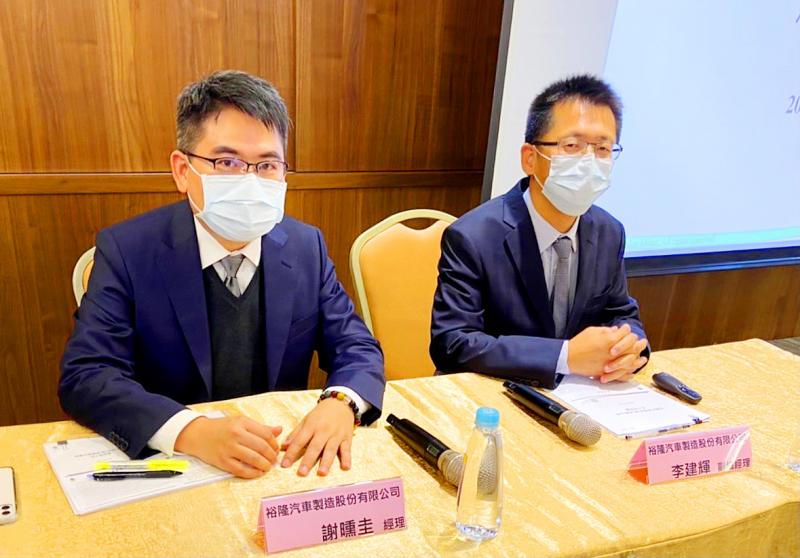Yulon Motor Co (裕隆汽車) yesterday cut its forecast of vehicle sales in Taiwan to 427,000 units this year, attributable to effects of the COVID-19 pandemic, as well as supply constraints of automotive semiconductors and shipping containers.
Yulon forecast that sales would decline 3.8 percent from 444,000 vehicles sold last year.
The automaker in November last year estimated a slower decline of 2.9 percent to 431,000 units.

Photo: Amy Yang, Taipei Times
The government might also phase out incentives for replacing older vehicles, which would weigh on the market, Yulon vice president Lee Chien-hui (李建輝) told investors in Taipei.
Vehicle buyers are eligible to a NT$50,000 (US$1,758) commodity tax refund when buying a new vehicle while retiring an old one.
Due to concerns over the possible cancelation of the policy, vehicle sales in the first quarter increased by 17.3 percent year-on-year to 118,000 units, he said.
Despite a conservative outlook for the local market, Lee said that Yulon’s operations stabilized following two years of turnaround efforts.
Yulon posted a net profit of NT$2.74 billion last year, reversing losses of NT$24.47 billion in 2019. Earnings per share were NT$2.8, compared with losses per share of NT$26.13 a year earlier.
Gross margin climbed to 23 percent from 7 percent.
Yulon’s real-estate development project in New Taipei City’s Sindian District (新店) progressed well, the automaker said.
Bookstore chain operator Eslite Spectrum Corp (誠品生活) and movie theater chain Vieshow Cinemas (威秀影城) are two of its tenants, Lee said.
The project would be completed in the fourth quarter of next year as scheduled, he said.

RUN IT BACK: A succesful first project working with hyperscalers to design chips encouraged MediaTek to start a second project, aiming to hit stride in 2028 MediaTek Inc (聯發科), the world’s biggest smartphone chip supplier, yesterday said it is engaging a second hyperscaler to help design artificial intelligence (AI) accelerators used in data centers following a similar project expected to generate revenue streams soon. The first AI accelerator project is to bring in US$1 billion revenue next year and several billion US dollars more in 2027, MediaTek chief executive officer Rick Tsai (蔡力行) told a virtual investor conference yesterday. The second AI accelerator project is expected to contribute to revenue beginning in 2028, Tsai said. MediaTek yesterday raised its revenue forecast for the global AI accelerator used

TEMPORARY TRUCE: China has made concessions to ease rare earth trade controls, among others, while Washington holds fire on a 100% tariff on all Chinese goods China is effectively suspending implementation of additional export controls on rare earth metals and terminating investigations targeting US companies in the semiconductor supply chain, the White House announced. The White House on Saturday issued a fact sheet outlining some details of the trade pact agreed to earlier in the week by US President Donald Trump and Chinese President Xi Jinping (習近平) that aimed to ease tensions between the world’s two largest economies. Under the deal, China is to issue general licenses valid for exports of rare earths, gallium, germanium, antimony and graphite “for the benefit of US end users and their suppliers

Dutch chipmaker Nexperia BV’s China unit yesterday said that it had established sufficient inventories of finished goods and works-in-progress, and that its supply chain remained secure and stable after its parent halted wafer supplies. The Dutch company suspended supplies of wafers to its Chinese assembly plant a week ago, calling it “a direct consequence of the local management’s recent failure to comply with the agreed contractual payment terms,” Reuters reported on Friday last week. Its China unit called Nexperia’s suspension “unilateral” and “extremely irresponsible,” adding that the Dutch parent’s claim about contractual payment was “misleading and highly deceptive,” according to a statement

Artificial intelligence (AI) giant Nvidia Corp’s most advanced chips would be reserved for US companies and kept out of China and other countries, US President Donald Trump said. During an interview that aired on Sunday on CBS’ 60 Minutes program and in comments to reporters aboard Air Force One, Trump said only US customers should have access to the top-end Blackwell chips offered by Nvidia, the world’s most valuable company by market capitalization. “The most advanced, we will not let anybody have them other than the United States,” he told CBS, echoing remarks made earlier to reporters as he returned to Washington